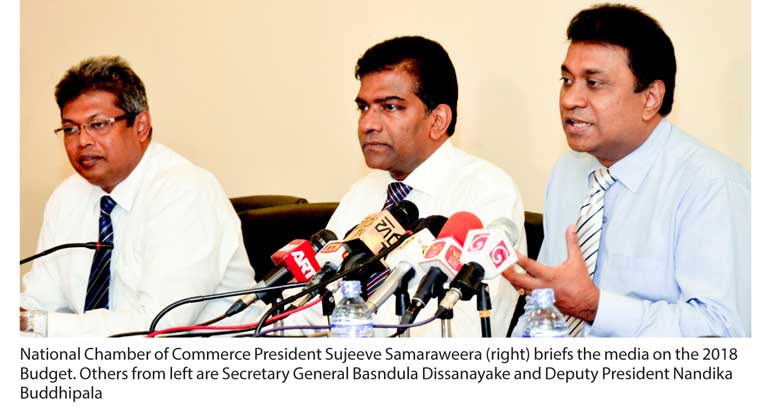Saturday Feb 21, 2026
Saturday Feb 21, 2026
Tuesday, 14 November 2017 00:00 - - {{hitsCtrl.values.hits}}

By Charumini de Silva
The National Chamber of Commerce of Sri Lanka (NCCSL) yesterday welcomed the 2018 Budget proposals but raised concerns over the medium- to long-term policy consistency of the Government’s revenue streams.
“We welcome the 2018 Budget, where it has articulated national policies focused on uplifting SME sector entrepreneurs, while taking some bold steps for trade liberalisation to encourage business development in the country,” NCCSL President Sujeeve Samaraweera told journalists in Colombo.
However, he pointed out that it would be challenging for the Government to provide an enabling environment to implement the proposals.
“The expectation of the business community was to have a consistent medium-term policy on Government revenue streams rather than short-term, ad hoc revenue policies such as the debt payment levy imposed on the banking sector and levy on telecom towers,” he added.
Samaraweera stressed that it was very difficult to absorb the shocks of short-term, ad hoc policy changes, adding that it was not only affecting local entrepreneurs but also hurting much-needed Foreign Direct Investments (FDIs) which were needed to bail out the debt-ridden economy.
He asserted that the Government should refrain from engaging in business and ensure an enabling business environment with consistent policies for the private sector. Acknowledging the efforts made by the Government for trade facilitation by implementing a single window system and trade information portal, Samaraweera noted that much needed to be done by the authorities without further delay.
“FDIs are critical for the development of the economy. When the Government holds road shows to attract foreign investments they must also deliver and facilitate once the investors come to Sri Lanka to commence businesses. We have been talking about a single window facility to fast-track trade but it still hasn’t been very effective,” he emphasised. When asked if this Budget has addressed the issue of increasing direct income taxes, Samaraweera said while certain steps had been taken more needed to be done. “I would say yes and no. I think we need to introduce a unique identification number like they have done in India where you can track the revenue of people, rather than sending the Inland Revenue Department behind them. We also need to be forthcoming as it is our responsibility. Certain initiatives like RAMIS are in progress but we need to fast-track them,” he added.
Commending the proposal to set up a monitoring agency at the Finance Ministry, it was pointed out that due to a lack of information they were unable to draw a comparison with the previous Budget and said the NCCSL sincerely expected the successful implementation of these efforts by the Government which was imperative for evaluating the objectives of the Budget moving forward. “We hope the Government will issue the gazettes on time and deliver them within a particular timeframe,” he said, adding that the 2018 Budget was not an election Budget with concessions. The development of women and youth entrepreneurship through the introduction of the Enterprise Sri Lanka credit scheme as well as proposals to develop the agricultural and fisheries sector were also welcomed by the NCCSL.
Noting that a lack of finance was a major challenge for the development of the SME sector, he said the allocation of Rs. 10 billion to the proposed SME guarantee fund as well as the Development Bank would greatly support the financial needs of SMEs in the future.
The Chamber observed mixed results in the economy through the Government’s trade liberalisation measures by introducing approximately 1,200 para-tariffs being removed. However, they lauded the efforts of the Government in promising to introduce antidumping laws in the near future, which they believe would be a positive measure in protecting domestic industries. “As the National Chamber we appreciate the measures taken through the Budget in these areas which have been consistently emphasised by us during the last couple of years,” he added.In addition, he called for a change in the archaic Custom Ordinance and the mindset of Custom officials towards a more cordial service noting that not every businessman was a fraud.
The support extended to education and the emphasis placed on setting up additional vocational training institutes were viewed positively, with the Chamber considering it helpful in providing skilled workers and addressing the prevailing labour shortage within the industrial sector. Samaraweera commended the Government’s focus on non-traditional sectors such as ICT, where it intends to increase foreign earnings to $ 5 billion, while also encouraging small to medium IT start-up companies by allocating Rs. 3 billion over the next five years through the Export Development Board.
He also suggested the Government should exploit new paradigms like being an energy hub in this part of the world. Road development projects, solid waste management proposals and tax reduction on all electric vehicles were observed as positive measures for the development of a greener economy.
The NCCSL believes development projects proposed for Kandy, Galle, Anuradhapura and Jaffna will provide much-needed equal development opportunities for the region and help establish national reconciliation in the country as well.